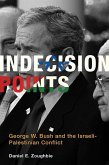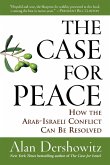In "The Case for Peace," Dershowitz identifies twelve geopolitical barriers to peace between Israel and Palestine-and explains how to move around them and push the process forward. From the division of Jerusalem and Israeli counterterrorism measures to the security fence and the Iranian nuclear threat, his analyses are clear-headed, well-argued, and sure to be controversial. According to Dershowitz, achieving a lasting peace will require more than tough-minded negotiations between Israelis and Palestinians. In academia, Europe, the UN, and the Arab world, Israel-bashing and anti-Semitism have reached new heights, despite the recent Israeli-Palestinian movement toward peace. Surveying this outpouring of vilification, Dershowitz deconstructs the smear tactics used by Israel-haters and shows how this kind of anti-Israel McCarthyism is aimed at scuttling any real chance of peace.
Alan Dershowitz used all his skills as an advocate to defend the Jewish state against the lies and distortions that have been hurled at it in recent years. The success of this book-hailed as "a lively, hotly argued broadside" by the Washington Post and "revealing and persuasive" by the Times (London)-has made him one of America's most sought-after commentators on Israeli-Palestinian relations. Two states, based on Israeli withdrawals from Gaza and most of the West Bank; a symbolic recognition by Israel of the rights of Palestinian refugees, with some compensation but no "right of return"; the division of Jerusalem; and a renunciation of violence, with the Palestinians taking all reasonable measures to stamp out terrorism. The problem: how to get there without more bloodshed. To that end, Dershowitz offers a plan that is bound to be controversial. Israel, he says, must take the lead in showing generosity of spirit. The Palestinians must take explicit, practical steps to turn their people against suicide bombers and hate. The U.S. must help bankroll the peace. And the polemical approach to Israeli-Palestinian relations must end-on university campuses, at the UN, in Europe, and in the media. For anyone who cares about the fate of Israel and the Middle East, this thought-provoking road map to peace will be required reading.
Hinweis: Dieser Artikel kann nur an eine deutsche Lieferadresse ausgeliefert werden.
Alan Dershowitz used all his skills as an advocate to defend the Jewish state against the lies and distortions that have been hurled at it in recent years. The success of this book-hailed as "a lively, hotly argued broadside" by the Washington Post and "revealing and persuasive" by the Times (London)-has made him one of America's most sought-after commentators on Israeli-Palestinian relations. Two states, based on Israeli withdrawals from Gaza and most of the West Bank; a symbolic recognition by Israel of the rights of Palestinian refugees, with some compensation but no "right of return"; the division of Jerusalem; and a renunciation of violence, with the Palestinians taking all reasonable measures to stamp out terrorism. The problem: how to get there without more bloodshed. To that end, Dershowitz offers a plan that is bound to be controversial. Israel, he says, must take the lead in showing generosity of spirit. The Palestinians must take explicit, practical steps to turn their people against suicide bombers and hate. The U.S. must help bankroll the peace. And the polemical approach to Israeli-Palestinian relations must end-on university campuses, at the UN, in Europe, and in the media. For anyone who cares about the fate of Israel and the Middle East, this thought-provoking road map to peace will be required reading.
Hinweis: Dieser Artikel kann nur an eine deutsche Lieferadresse ausgeliefert werden.
"ALAN Dershowitz has a lovely vision of Middle East peace, imagining democratic Israel and a democratic Palestine prospering together. Harvard Law's celebrity professor advocates a two-state solution, creating Palestine out of the territories Israel won in the 1967 war. Dershowitz believes two viable states with secure borders and stable political cultures can emerge from one of the world's most troubled pieces of real estate. Invoking history, justice, reason and the rule of law, he analyzes the problems, seeking mutually agreeable solutions...." (The New York Post, August 28, 2005)








